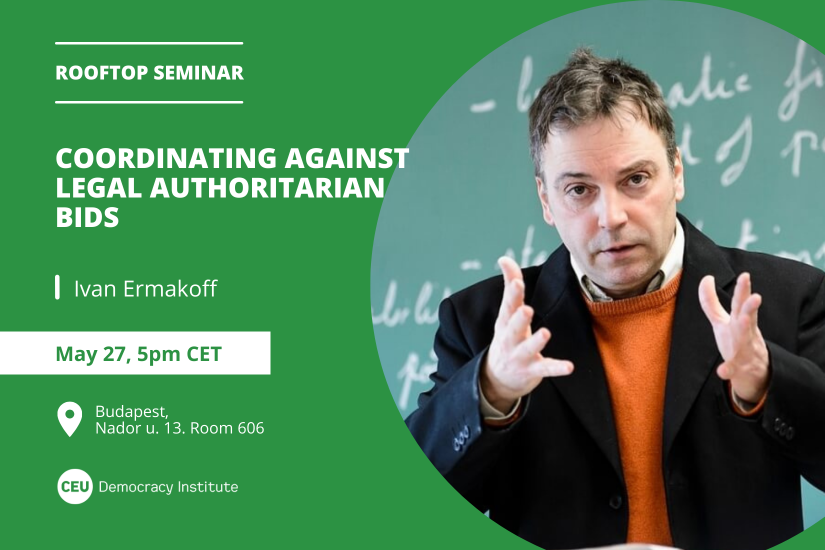
The De- and Re-Democratization (DRD) Workgroup of the CEU Democracy Institute cordially invites you to its next Rooftop Seminar. This is a joint event with the Democracy Institute's Democracy in History Workgroup.
You can check our past events here.
If you would like to attend, please register here.
Please keep in mind that external guests cannot enter the building without prior registration. Due to space restrictions, attendance is limited. We ask registered visitors to pick up their temporary visiting card at the reception. The event is not open to the press.
The paper is available upon request from the author.
Abstract:
How does the legality of authoritarian power bids affect strategies of democratic consolidation, and which tactical lessons can be learnt therefrom? Drawing on observations culled from the collective dynamics at play in 1933 in Germany and 1936-1937 in Belgium, this article identifies three effects of legalism: (1) the perception of power bids as politics as usual (normalization effect), (2) the belief that compromise under the aegis of law moderates authoritarian ambitions (mitigation effect), and (3) the formation of mutual expectations of compliance (alignment effect). Each effect points to a mode of coordination: the organizational coordination of defensive alliances, the epistemic coordination of threat assessments, and the tacit coordination of mutual expectations. This modal understanding of coordination processes underscores the need for democrats and proponents of the rule of law to gauge the stakes entailed by an authoritarian power bid and the impacts of public stances on collective capacities for counteraction.
Speaker:
Ivan Ermakoff is Professor of Sociology at the University of Wisconsin, Madison. His research agenda is centered on transition processes and collective situations in which individuals are confronted with decisions that challenge their sense of self-interest, preservation or identity. He has been investigating aristocrats facing new matrimonial regulations in Europe in the central middle ages, parliamentarians confronted with the prospect of their own collective abdication, political leaders devising strategies of political survival and/or democratic consolidation in times of democratic crisis, and civil servants confronted with the task of enforcing inhumane policies. In these different instances, to identify collective processes and reconstruct the specifics of the relevant empirical cases, he draws on multifaceted tools of analysis—formal, quantitative and hermeneutic—applied to a variety of historical sources. This approach combines historical research with a set of methods geared to probing the empirical soundness of hypotheses that can be transposed to different times and places.
Discussant:
Andreas Schedler is a Senior Research Fellow at the CEU Democracy Institute. He is Head of the Research Group on De- and Re-Democratization (DRD) and a Visiting Professor at CEU Vienna. He earned his PhD from the University of Vienna. Before joining the CEU, he was a professor of political science at the Center for Economic Teaching and Research (CIDE) in Mexico City. A leading comparative scholar of democracy, democratization, and authoritarianism, he has widely published on authoritarian elections, democratic consolidation and transition, anti-political-establishment parties, political accountability, and organized violence. His current research focuses on political polarization and the destruction of basic democratic trust.
Chair:
Flóra Hevesi holds an MA in public policy (2023) from Central European University and a BA in international relations (2019) from Corvinus University of Budapest. During her studies, she was a member of Rajk College for Advanced Studies, where she attended additional courses on methodology, social sciences and philosophy. Her research interests lie in the field of democratic, civic and environmental engagement, education and political philosophy. Before joining the Democracy Institute, she worked as a student consultant for the International Press Institute and junior analyst for 21 Research Center.